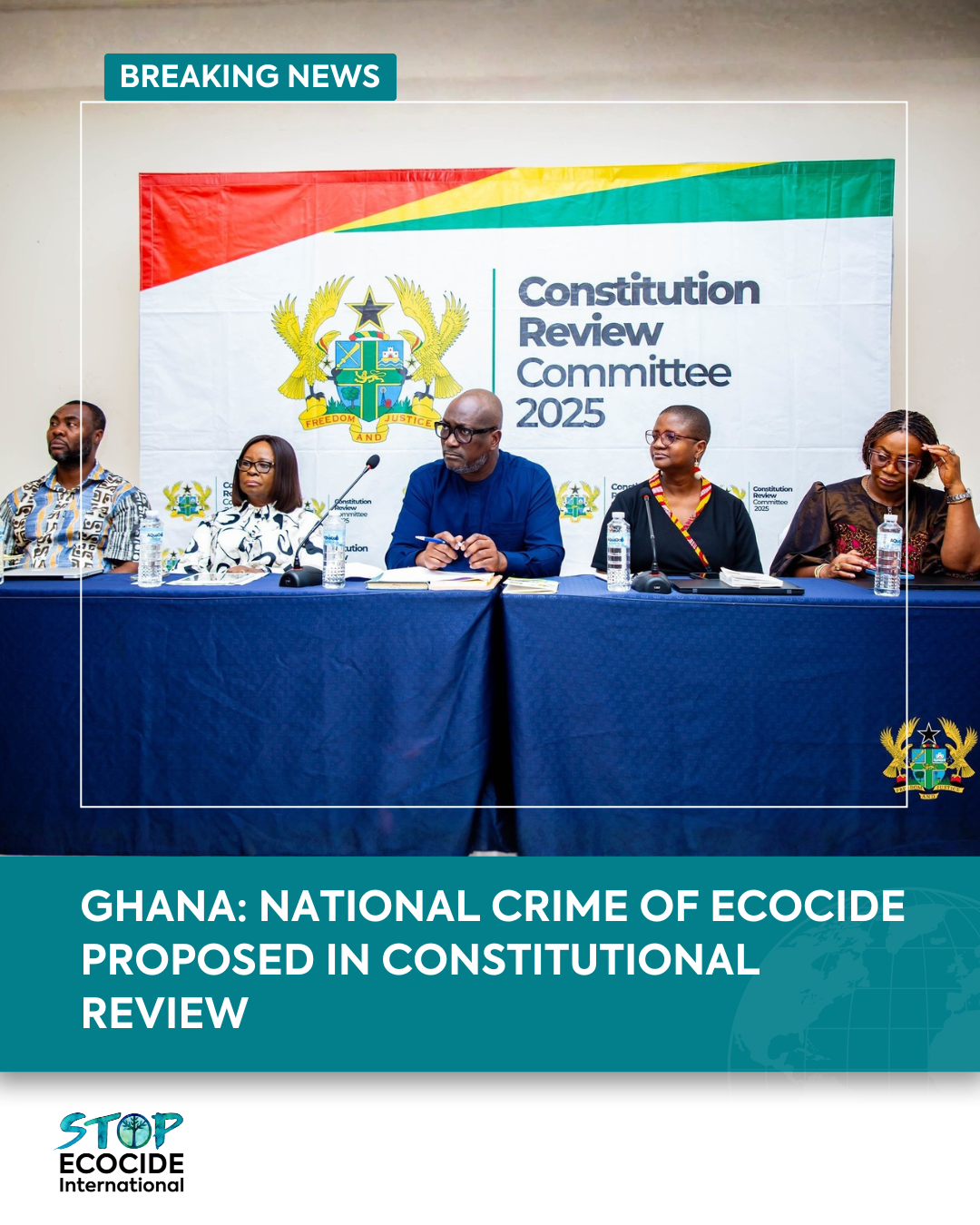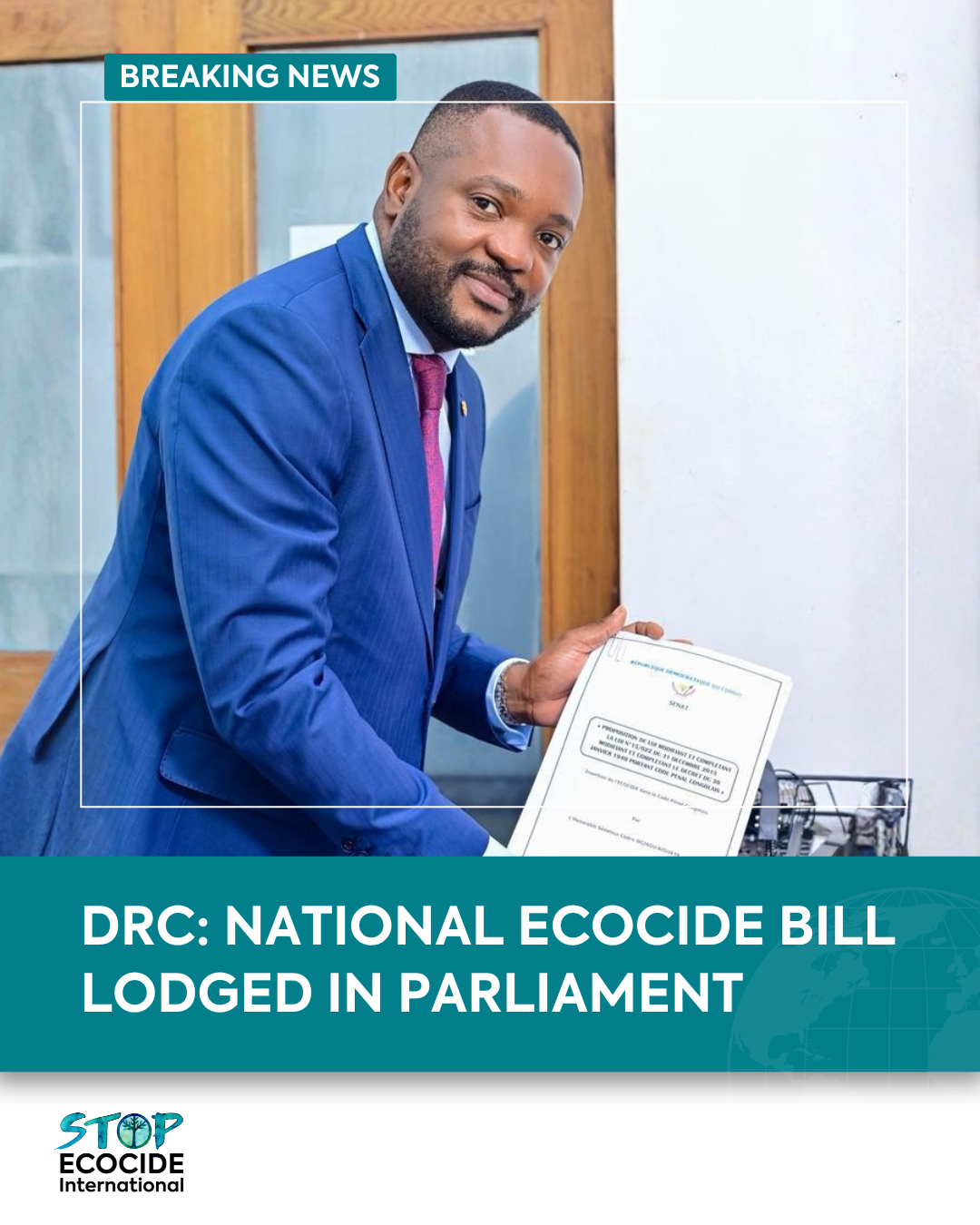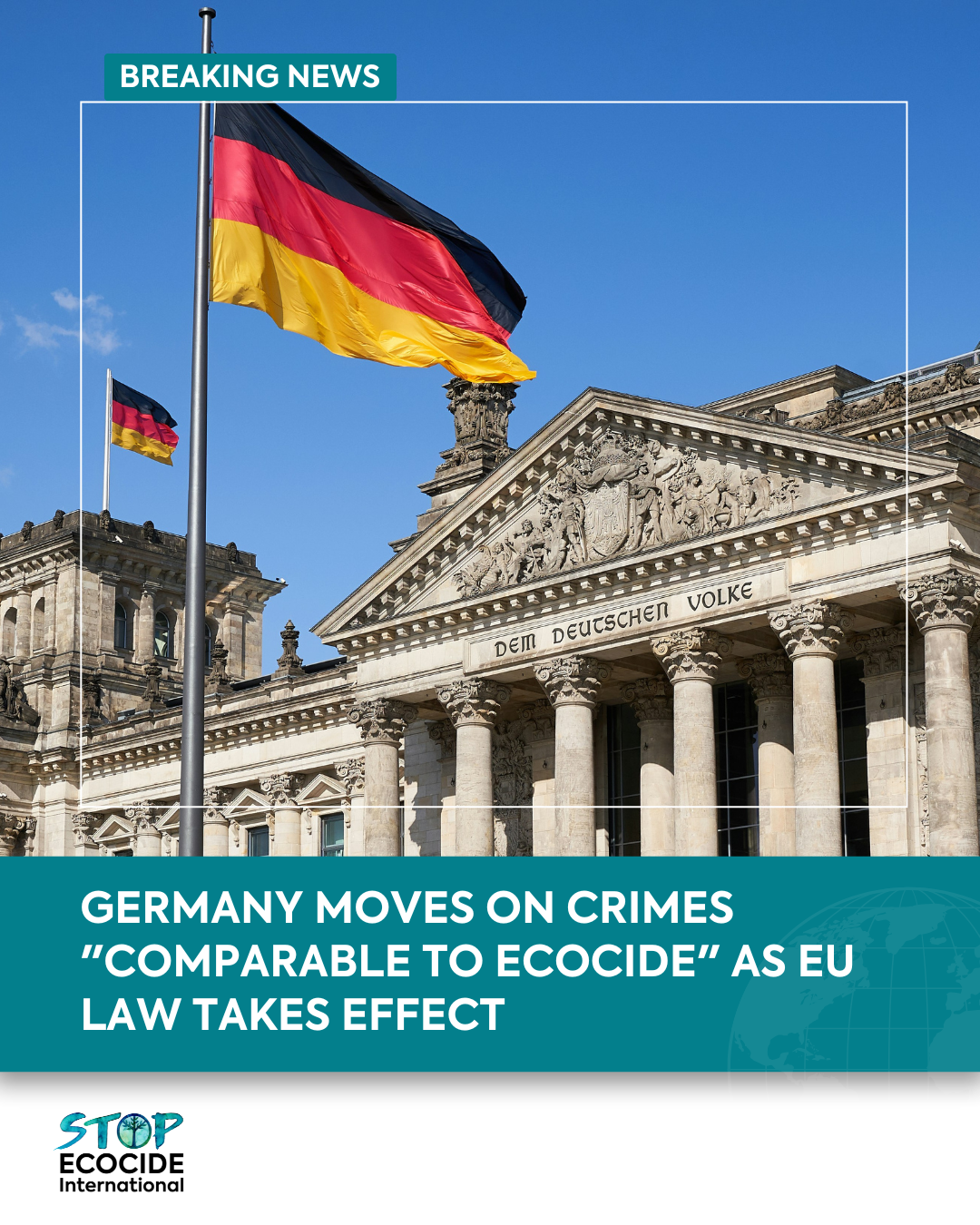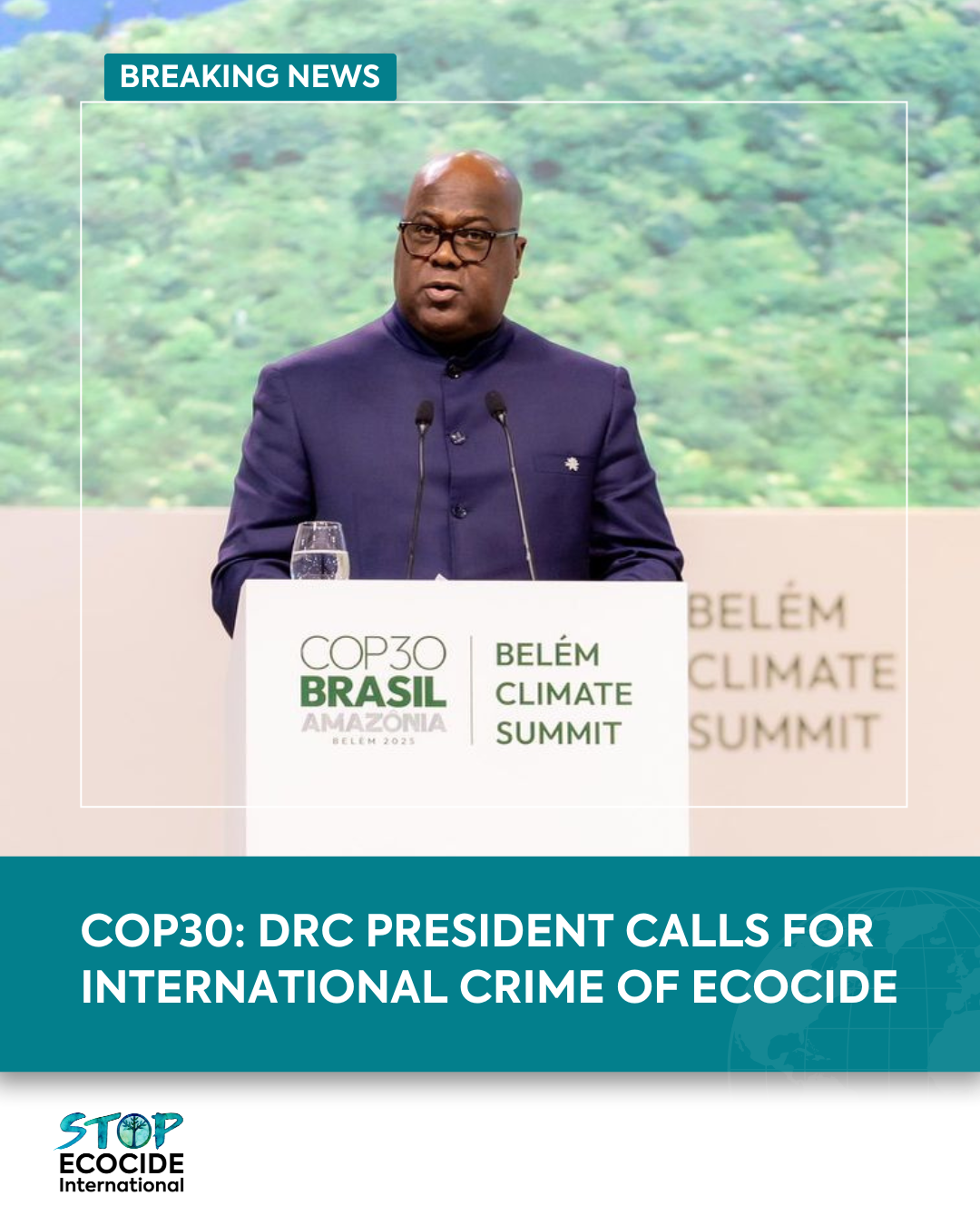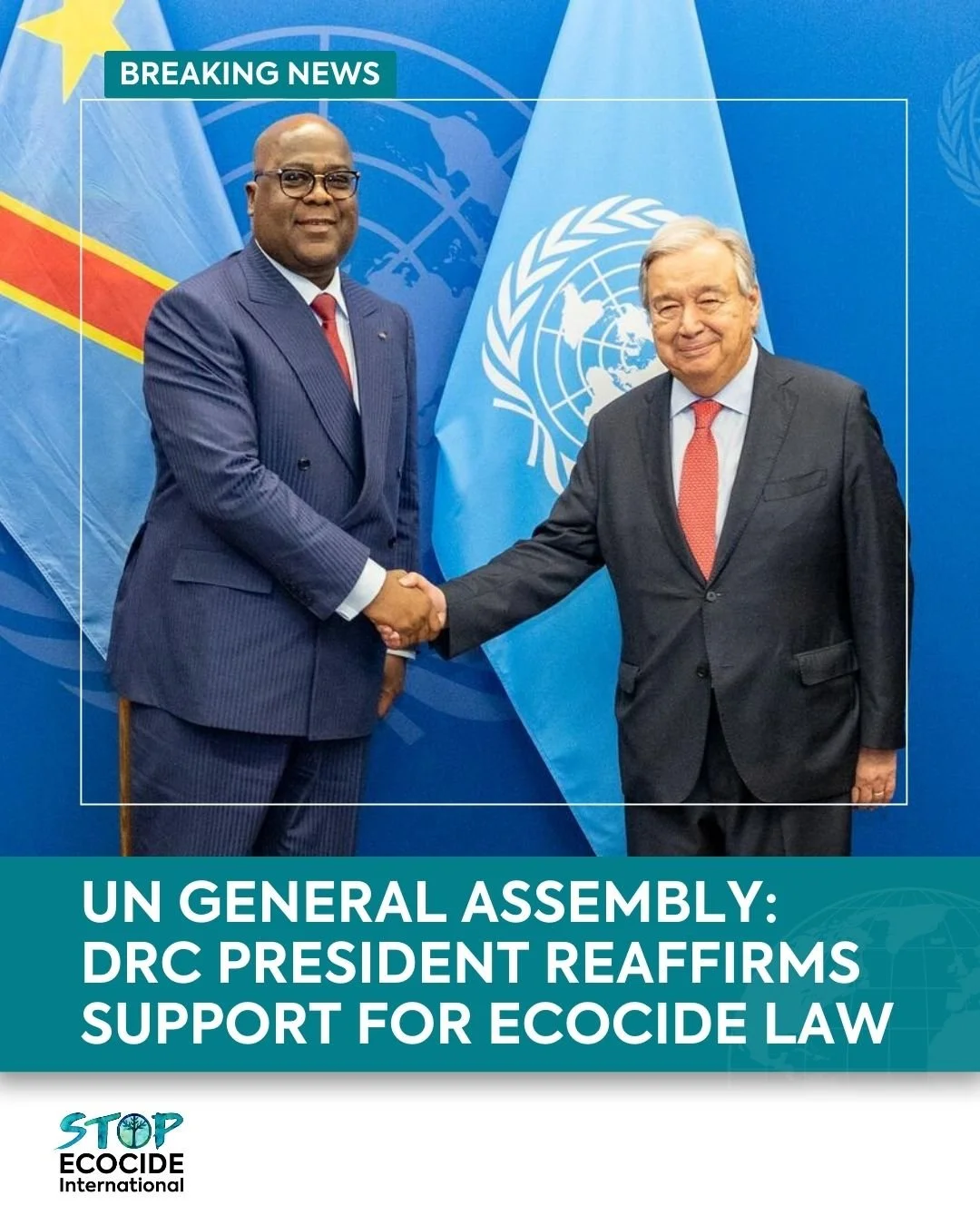Scottish Parliament Votes to Advance Ecocide Bill
The Scottish Parliament has voted to advance the Ecocide (Scotland) Bill, placing Scotland on track to become the first UK nation to criminalise severe environmental destruction.
Ghana: National crime of ecocide proposed in state-mandated constitutional review
In a far-reaching package of reforms presented to President John Dramani Mahama, Ghana’s Constitution Review Committee has proposed establishing a domestic crime of ecocide, stating:
“In order to express society’s revulsion and opprobrium to illegal mining in Ghana, the Committee will be remiss in its duty of constitutional review if it does not recommend the creation of an offence of ecocide with very stiff and punitive sanctions. This further gives true expression to the right to a clean environment.”
Congo Basin Climate Commission (CBCC), representing 17 states, calls for ecocide to be recognised as an international crime
At the United Nations Environment Assembly, the Congo Basin Climate Commission (CBCC) signalled firm support for recognising ecocide as an international crime. In a meeting with Stop Ecocide International, Her Excellency Arlette Soudan-Nonault, Republic of the Congo Minister of the Environment, Sustainable Development and the Congo Basin and Executive Secretary of the CBCC, confirmed that the 17-nation Commission will support efforts to advance the issue within regional and continental processes.
DRC: National Ecocide Bill Lodged in Parliament
Senator Cédric Ngindu Biduaya of the Democratic Republic of the Congo has formally lodged a bill in the national Parliament to establish ecocide as a domestic criminal offence, marking a decisive step towards strengthening legal protection for ecosystems across the country and the Congo Basin.
Germany moves to criminalise cases “comparable to ecocide” as EU Directive begins entering national law
Germany has published a draft reform of its environmental criminal law, making an early move to translate the EU’s Environmental Crime Directive into national law. The Directive requires all Member States to introduce stronger criminal provisions for serious environmental destruction by May 2026, including qualified offences for widespread, long-lasting or irreversible damage “comparable to ecocide”.
Global Civil Society Calls for an International Crime of Ecocide ahead of UN Environment Assembly
A joint statement adopted at the 21st Global Major Groups and Stakeholders Forum (GMGSF-21) has called for ecocide to be recognised as a crime at national and international levels. Released ahead of this year’s UN Environment Assembly (UNEA-7), the text reflects the positions of NGOs, Indigenous Peoples and their communities, youth, women, farmers, workers, local authorities and the science and technology community.
India: Ecocide Bill introduced in Parliament
India’s Parliament has seen the formal introduction of a Private Member’s Bill proposing the criminalisation of ecocide in domestic law. The Bill addresses severe environmental harm caused by both individuals and companies, and sets out a detailed framework for investigation, punishment and ecological restoration. The Bill’s progress now depends on selection in the Private Members’ ballot during a forthcoming Budget Session (January 2026).
Historic ICC Policy Puts Ecological Harm at the Centre of International Criminal Law
In a landmark step for the International Criminal Court, the Office of the Prosecutor (OTP) has issued a comprehensive policy devoted entirely to environmental damage, signalling a marked shift in how international justice will engage with ecological harm.
Moldova, Portugal and the EU Sign New Council of Europe Convention Criminalising Harm ‘Tantamount to Ecocide’
The Council of Europe has opened for signature its new Convention on the Protection of the Environment through Criminal Law, a landmark instrument enabling states to prosecute intentional conduct resulting in environmental disasters “tantamount to ecocide”.
COP30: DRC President Calls for International Crime of Ecocide
At the opening ceremony of COP30 in Belém, Félix Tshisekedi, President of the Democratic Republic of the Congo (DRC), reaffirmed his country’s support for the formal proposal by Vanuatu, Fiji and Samoa to amend the Rome Statute and recognise ecocide as a standalone international crime.
In his address, President Tshisekedi described the escalating environmental destruction linked to conflict in the DRC as “an ecological war” and emphasised the global significance of criminalising severe and widespread or long-term damage to nature.
Ecocide Law Reaches the UN Security Council
Ecocide law was raised three times during the UN Security Council's session on environmental impact of armed conflict and climate-driven security risks, demonstrating growing diplomatic attention to establishing mass environmental destruction as an international crime.
Global Youth Demand Ecocide Law Ahead Of COP30
The 2025 Global Youth Statement representing thousands of young people from over 100 countries has called for the adoption of ecocide laws to hold corporations and states accountable for environmental destruction, while explicitly recognising that "wars, genocides and conflicts cause environmental degradation, exacerbate climate change through unchecked, boundless emissions."
The 91-page policy document, developed through YOUNGO - the official children and youth constituency of the UNFCCC - will be presented at COY20 and COP30 in Belém, Brazil this November.
NGO Forum urges Africa’s human-rights commission to back recognition of ecocide as an international crime
The Forum on the Participation of NGOs (“NGO Forum”) held ahead of the 85th Ordinary Session of the African Commission on Human and Peoples’ Rights (ACHPR) has adopted a civil-society resolution urging the Commission to support recognition of ecocide, defined in the resolution (drawing on the work of the Independent Expert Panel, 2021) as ‘unlawful or wanton acts committed with knowledge that there is a substantial likelihood of severe and either widespread or long-term damage to the environment’. The resolution also encourages African states to strengthen domestic legal protections.
Broad Swedish Parliamentary Support for Ecocide Law
Representatives from all Sweden’s non-government parties have submitted private member’s bills calling for ecocide to become an international crime, demonstrating remarkable cross-party agreement on environmental protection.
All parties in opposition— Sweden’s largest political party the Social Democrats, the Centre Party, the Green Party, and the Left Party—have proposed adding mass environmental destruction to the Rome Statute, and a member of the Liberals, from the governing coalition, proposes trials for crimes, including ecocide, committed during the war in Ukraine.
Governments vote for recognition of ecocide at world’s largest conservation congress
At its World Conservation Congress in Abu Dhabi (9-15 October), the International Union for Conservation of Nature (IUCN), the world's largest and most diverse environmental network, comprising more than 1,400 member organisations including states, government agencies, civil society groups and Indigenous Peoples' organisations, has voted to adopt Motion 061, "Recognising the crime of ecocide to protect nature."
Ghana: Civil Society Demands Ecocide Law to Combat Illegal Gold Mining Crisis
A coalition of Ghanaian civil society organisations has issued an urgent call to President John Dramani Mahama to take immediate action against what they describe as an ongoing "ecocide" driven by illegal gold mining (galamsey) in the country.
The detailed letter from the Ghana Coalition Against Galamsey, representing organisations including OneGhana Movement, A Rocha Ghana, Peasant Farmers Association of Ghana, Ghana Institution of Engineering, University Teachers Association of Ghana (UTAG), and more than 20 others, presents evidence from nonprofit Pure Earth and Ghana's Environmental Protection Agency showing mercury, arsenic, and lead contamination across Ghana's water, soil, and food systems.
Swedish Prime Minister Confirms Support for International Crime of Ecocide
Sweden's Prime Minister Ulf Kristersson has publicly confirmed government support for establishing ecocide as the fifth core crime under the Rome Statute of the International Criminal Court, responding to questions from Green Party Member of the Riksdag Rebecka Le Moine during an open EU Committee meeting.
Peru's Historic Lima Bar Association Grants Top Honor to Ecocide Law Advocates
The Ilustre Colegio de Abogados de Lima (Lima Bar Association) has placed the legal recognition of ecocide at the center of its highest civic distinction, the Medalla Cívica del Derecho (Civic Medal of Law), by awarding the medal to Jojo Mehta, CEO and co-founder, and Rodrigo Lledó Vásquez, Americas Director, both of Stop Ecocide International.
DRC President Reaffirms Country’s Support for International Crime of Ecocide at UN General Assembly
In a landmark address to the 80th Session of the United Nations General Assembly in New York, President Félix-Antoine Tshisekedi Tshilombo of the Democratic Republic of the Congo reaffirmed his country’s formal support for recognising ecocide as a crime under the Rome Statute of the International Criminal Court (ICC).
Zimbabwe Parliament Opens Inquiry Into Potential Ecocide Bill
Zimbabwe's Parliamentary Portfolio Committee on Environment, Climate and Wildlife has launched a formal inquiry in response to a petition [link to petition] by Kwekwe-based human rights and environmental defender Emmanuel Nkosilathi Moyo calling for the country to criminalise ecocide.


